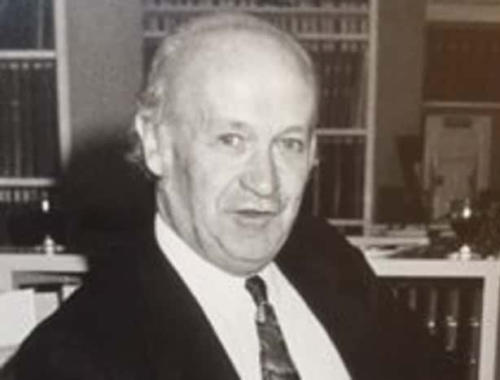Willie Russell obituary
Posted on November 9, 2018 by Richard Randall
Willie Russell, molecular virologist and supporter of the Microbiology Society: an obituary. Written with thanks to Professor Richard Randall and Willie’s friends and family

Willie Russell, who was emeritus Professor of Virology at the University of St Andrews, died peacefully in his sleep on 31st October 2018 at the age of 88.
Born into a working-class background in a tenement block in Glasgow, Willie graduated with a first-class degree and Ph.D. in chemistry from Glasgow University. In 1959, after two years National Service as a chemist working in Royal Ordnance factories followed by two years in the research laboratories of J P Coats Ltd in Paisley, he took the bold step of returning to academia and the even bolder step in changing fields from chemistry to the expanding discipline of virology.
oining the newly formed Medical Research Council and the University of Glasgow Unit of Experimental Virus Research, he used electron microscopy to investigate the structure of herpesviruses and showed that its genetic information was DNA, rather than RNA as had been previously thought.
In 1963 he moved to the Ontario Cancer Unit in Toronto, working on bacteriophage biology, structure and genetics, and in 1964 Willie became the first non-medical researcher in the Division of Bacteriology and Virology at the National Institute for Medical Research (NIMR), London.
Willie was Head of the Virology Division, NIMR from 1973 until 1984, when he moved back to Scotland following the death of his first wife, Dorothy. He was appointed Chair of the Department of Biochemistry and Microbiology at the University of St Andrews, in which he established the Virology Unit that continues to thrive to this day. As well as continuing his own research, Willie also mentored many Ph.D. students who went on to have successful careers in science. He was always enthusiastic about science and virology in particular, encouraging members of the Biochemistry and Microbiology Department to win research grants and publish their research in high quality journals. In 1987, he was elected a fellow of the Royal Society of Edinburgh.
Willie was a very active member of the Society of General Microbiology, now the Microbiology Society, which he joined in 1961. He was a member of the Editorial Board of the Journal of General Microbiology from 1969 to 1972, when he became an Editor until 1976. He was the convenor of the Virus Group from 1984 to 1989, and a member of Council from 1987 to 1991.
From his youth Willie was a committed Christian Socialist – as a boy he attended a summer camp run by the socialist Clarion Society – but it was not until he was living in London that he joined the Labour Party. He was active in the Hendon North Constituency Party, standing for Barnet Council (in a safe Conservative ward) and being nominated by the Labour Party as a school governor. He was a keen supporter of the Campaign for the Advancement of State Education. After his move back to Scotland he was twice chair of North East Fife Constituency Labour Party, rescuing it from the brink of extinction in time to fight a vigorous campaign in the 1992 general election.
In the 1990s Willie’s energy and leadership were of critical importance in founding Scientists for Labour. He was the organisation’s first chair, holding the post until 2010 and lobbying for adequate funding for scientific research and education, encouraging fellow scientists to contribute their specialist expertise, and determined and courageous in his demand that policies in highly contentious areas such as nuclear power and animal experimentation should be based on scientific evidence. His last contribution in this area was to frame a resolution for the 2016 Scottish Labour Conference calling for an evidence-based approach to the issue of genetic modification in agriculture.
On retirement in 1995 Willie became Emeritus Professor and continued to develop his many research interests. Moving to the village of Crail he was an enthusiastic participant in church and festival activities, while retaining his membership of the St Andrews Chorus. Willie had always been a truly competitive participant in sports and it was no great surprise that at the age of eighty he should join Crail Bowling Club where, characteristically, he became president for two and half years. Willie Russell leaves behind a giant footprint of achievement, example and goodness that remains an inspiration to all whose lives were touched by his.
He is survived by his second wife Reta and his step-son, Willie, and by grandchildren and great grandchildren. His step-daughter Maggie and two children, Lucy and Ian, he absolutely adored.

